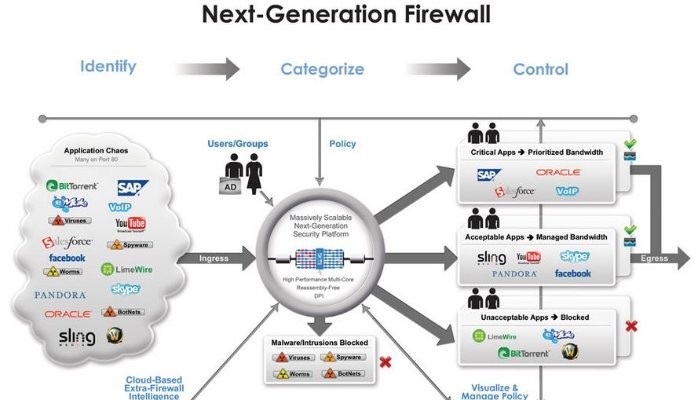
A next-generation firewall (NGFW) is a type of firewall that provides advanced security features beyond traditional firewall capabilities. NGFWs incorporate features such as deep packet inspection, intrusion prevention, and application-level visibility and control, enabling them to detect and block sophisticated threats that traditional firewalls may miss.
NGFWs are designed to address the limitations of traditional firewalls, which typically focus on port and protocol-based filtering. With the rise of web applications and cloud computing, traditional firewalls are no longer effective at protecting against modern threats such as advanced malware, targeted attacks, and data exfiltration.
NGFWs use advanced security techniques such as behavioral analysis, machine learning, and threat intelligence to detect and block threats in real-time. They can identify and block specific applications and services based on their behavior, as well as identify and block malicious traffic that may be disguised as legitimate traffic.
NGFWs are also designed to be more scalable and flexible than traditional firewalls, with the ability to integrate with other security solutions such as security information and event management (SIEM) systems and endpoint security solutions.
A Next Generation Firewall (NGFW) is an advanced type of firewall that goes beyond traditional firewalls by providing additional features and capabilities for network security. NGFWs are designed to be more sophisticated and intelligent than traditional firewalls, and they offer better protection against modern threats such as advanced persistent threats (APTs), zero-day attacks, and application-layer attacks.
NGFWs provide more advanced capabilities than traditional firewalls by incorporating features such as:
1. Deep Packet Inspection (DPI): This allows NGFWs to examine the contents of network packets in more detail than traditional firewalls. This enables them to identify and block threats that may be hidden within legitimate traffic.
2. Application Control: NGFWs have the ability to identify and control specific applications and protocols, providing granular control over network traffic.
3. Intrusion Prevention Systems (IPS): NGFWs have the ability to detect and prevent intrusions by identifying and blocking malicious traffic before it can enter the network.
4. User Awareness: NGFWs can identify and control user traffic based on user identity and role. This allows administrators to apply policies that restrict access to sensitive data and applications.
5. Threat Intelligence: NGFWs can use threat intelligence feeds and other sources of information to identify and block known threats in real-time.
NGFWs are an essential component of modern network security infrastructure, and they can help organizations to protect against a wide range of threats. By providing advanced capabilities for threat detection and prevention, NGFWs can help organizations to maintain a secure and reliable network environment.
Overall, NGFWs provide a more robust and comprehensive security solution for organizations that require advanced threat protection capabilities.

